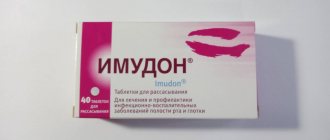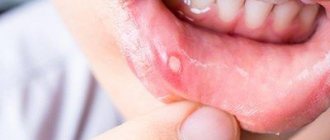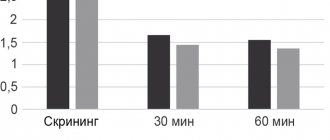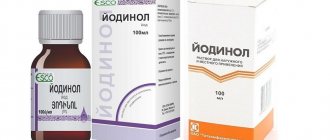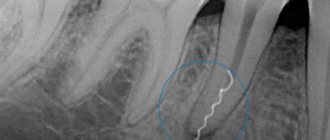As a result of the development of infectious and inflammatory diseases of the throat and oral cavity, an unpleasant and even cutting pain in the throat often appears. An unpleasant symptom negatively affects general well-being and interferes with normal eating, drinking and talking. The pain most often continues for several days. To alleviate the condition, many doctors advise taking Imudon.
Imudon is a medicine that is of bacterial origin. Has an immunostimulating effect. The drug helps to overcome the emerging disease. Before taking it, you should read the indications, instructions for use and make sure there are no contraindications.
Features of Imudon
The medicine has been sold in pharmacies for more than 2 decades. The drug is one of the local immunostimulants. Once in the oral cavity, it strengthens the immune system. The active components included in the composition are not capable of leading to the appearance of any disease or causing complications of an existing disease. The action of the active components leads to an increase in the number of phagocytes (cells of the immune system). These cells absorb and destroy foreign elements. The action of the active components is supported by the auxiliary elements present in the composition.
Treatment of acute and chronic pharyngitis with imudon
The pharynx is innervated by the branches of the trigeminal, glossopharyngeal, accessory and vagus nerves, as well as the laryngeal-pharyngeal branches of the superior cervical ganglion of the sympathetic trunk. Inflammation of the pharyngeal mucosa in acute respiratory diseases is most often caused by a decrease in local immunity due to exposure to the same pathogens (V.D. Dragomiretsky et al., 1989). Subsequently, constant bacterial irritation of the richly innervated mucous membrane of the pharynx leads to relapse of inflammation and the occurrence of persistent pain (including a feeling of dryness and discomfort). Among the existing treatment methods, the most convenient is the use of lozenges with a symptomatic and antiseptic component of action. However, these drugs are effective only in the first days of the disease and later, with repeated courses of treatment, they turn out to be useless and require a transition to other similar medications. In this case, a drug with a longer effect is needed. In this regard, a new direction in the treatment of acute and chronic inflammatory diseases of the pharynx has emerged, which consists of the use of drugs with a local immunomodulatory effect, such as the drug imudon [1, 3], which are lysates of pathogens of upper respiratory tract infections. The active component of imudon is a polyvalent antigenic complex of lysates of 13 strains of microorganisms, the composition of which corresponds to the pathogens that most often cause inflammatory diseases in the oral cavity and pharynx. Imudon promotes an increase in immunocompetent cells, activates phagocytosis, enhances the production of endogenous interferon, and increases the content of secretory immunoglobulin A and lysozyme in saliva. Imudon contains excipients - citric acid, which eliminates swelling and inflammation, and mint powder, which has an analgesic and deodorizing effect.
This study was conducted to study the effectiveness of the drug imudon in the treatment of acute and chronic pharyngitis. We observed 27 patients, 16 of them with acute pharyngitis and 11 with various (mainly catarrhal and hypertrophic) forms of chronic pharyngitis. The average age of the patients was 37.5 ± 8.22 years. The course of treatment with imudon as monotherapy in patients with acute pharyngitis was 8 days, 8 tablets per day, with chronic pharyngitis - 10 days, 6 tablets per day. Patients swallowed the tablet at least 1 hour before meals. Treatment began on the first or second day after the onset of signs of the disease. During the treatment, the severity of characteristic symptoms was assessed: sore throat, feeling of dryness and soreness in the throat, as well as objective data: hyperemia and swelling of the mucous membrane, the presence of discharge. The comparison group consisted of patients who received traditional treatment (irrigation and inhalation with anti-inflammatory drugs, inhalation and cauterization of granules for granulosa pharyngitis). All patients underwent pharyngoscopy and laryngoscopy; in some patients, a study of the biocenosis of the pharynx was performed.
In the group of patients with acute pharyngitis who received imudon, regression of disease symptoms was observed 1–2 days earlier.
Clinical example1
| Figure 1. Acute pharyngitis. Before treatment |
Patient K., 29 years old, over the past few years, 1-2 times a year, suffered from acute respiratory viral infections, manifested by the clinical symptoms of acute pharyngolaryngitis and characterized by a protracted course (Fig. 1). In this case, the disease, as a rule, began with acute pharyngitis, then, if treatment was untimely, catarrhal laryngitis was added. At the next appearance of symptoms, the patient began treatment with imudon according to the above regimen. Already on the 2nd day, pain and discomfort in the throat decreased; no dysphonia was observed, and on the 6th day there was complete recovery, confirmed by pharyngoscopy and laryngoscopy data (Fig. 2).
| Figure 2. Acute pharyngitis. After treatment |
In the group of patients with chronic pharyngitis who received imudon therapy, recovery occurred 3–4 days earlier compared to patients receiving traditional treatment, and exacerbations were observed less frequently.
Clinical example 2
Patient T., 38 years old, suffered from chronic catarrhal pharyngitis for three years with annual exacerbations 3–5 times a year, while taking absorbable tablets with antiseptics (Fig. 3). During the next exacerbation, she was treated with Imudon, 8 tablets per day for 10 days. An improvement in the condition was noted on days 5–6, and complete disappearance of signs of inflammation was observed on days 9–10 (Fig. 4). However, no exacerbations were observed within 8 months. This example shows that treatment with imudon gives a more lasting effect than traditional antiseptic therapy.
| Figure 3. Chronic pharyngitis. Before treatment |
Thus, imudon is an effective treatment for acute and chronic inflammatory diseases of the pharynx and can be used both for monotherapy of these diseases and in combination with other treatment methods.
All patients noted that the drug was well tolerated, had a pleasant taste, had no side effects, and was compatible with any medications.
| Figure 4. Chronic pharyngitis. After treatment |
The rapid therapeutic and symptomatic effect of the drug imudon is due to the activation of phagocytosis, increased production of endogenous interferon and lysozyme. Excipients in the composition of the drug contribute to this rapid therapeutic effect, and the immunoprotection of the pharyngeal mucosa due to the production of sIgA in combination gives a lasting therapeutic and prophylactic result. The use of the drug imudon makes it possible to influence the etiological and pathogenetic factors that play a direct role in the development of acute and chronic inflammatory diseases of the pharynx.
Literature
- Arefieva N. A., Medvedev Yu. L. Immunological aspects of anti-inflammatory therapy in otorhinolaryngology // Proceedings of the conference dedicated to the 5th anniversary of the Russian Society of Rhinologists. M., 1997. pp. 15–17.
- Dragomiretsky V.D., Evchev F.D., Bazhora Yu.I. Indicators of local immunity of the mucous membrane of the oral pharynx in patients with chronic pharyngitis // Journal of ear, nose and throat diseases. 1989. No. 6. pp. 21–23.
- Deffez JP et al. Potentialisation preoperatoire des defenses immunitaires ou antibiotherapie postoperatoire. Revue stomatochir. maxillofac. 1985. pp. 320–326.
I. I. Akulich , Candidate of Medical Sciences A. S. Lopatin, Doctor of Medical Sciences, Professor of the Central Clinical Hospital of the Medical Center for the Administration of the President of the Russian Federation, Moscow
Adverse reactions and overdose
Negative effects may occur as a result of taking the drug:
- from the gastrointestinal tract: nausea, vomiting, pain in the stomach;
- from the respiratory system: cough, exacerbation of asthma;
- allergies: skin rash, urticaria;
- from the circulation: thrombocytopenia.
Other reactions include high body temperature.
No cases of overdose have been recorded to date.
Perhaps we are ahead of the rest and suffer least from ARVI/flu, but this is not certain. Exactly what was ironic above: in fact, you have a cold, because it is normal for a person to catch a cold a couple of times a year: we do not know how to effectively fight respiratory viruses and prevent the diseases they cause. We just don’t know how, we need to understand and forgive.
You may disagree with this, but by taking these drugs, you will get sick as much as people who do not take them, only you will not have any money. There is no need to try to strengthen the immune system with anything, simply because it cannot be strengthened with anything.
special instructions
Children under 6 years of age should take the tablets only under parental supervision.
If the patient needs to rinse the mouth, this can be done at least an hour after taking the tablet, otherwise its therapeutic effect will be reduced.
Taking the medicine does not in any way affect the ability to drive vehicles and other mechanisms that require special concentration.
If a person has bronchial asthma, then using the drug can aggravate the condition and lead to another attack, so in this case, taking Imudon is contraindicated.
Immunocorrective therapy for infectious lesions of the oral cavity
Results of clinical use of imudon
In recent years, one of the promising areas in increasing the effectiveness of therapy and preventing many diseases is the use of immunocorrective agents and methods. Currently, among the main groups of immunocorrective drugs, immunomodulators of microbial origin are of interest, among which there are three main groups - purified bacterial lysates, immunostimulating membrane fractions and bacterial ribosomes in combination with membrane fractions. New generation immunomodulators that can activate the formation of antibodies and stimulate defenses in the oral mucosa deserve special attention. Among them, Imudon should be mentioned first of all.
Imudon (produced by an international pharmaceutical company) belongs to the group of purified bacterial lysates. The drug is made from a mixture of lysates of strains of the most common bacterial and fungal pathogens of pathological processes in the oral cavity. Among them are Lactobacillus acidophilus, Streptococcus aureus, Klebsiella pneumoniae, Corinebacterium pseudodiphtericum, Candida albicans and others.
Imudon is intended for specific antimicrobial and anti-inflammatory immunotherapy of oral diseases. The drug is a polyvalent complex of antigens that can cause the formation of antibodies. The therapeutic effect of imudon is explained by its influence on the immune system, which is expressed in an increase in phagocytic activity due to a qualitative improvement in phagocytosis, an increase in the content of lysozyme in saliva, stimulation and an increase in the number of immunocompetent cells responsible for the production of antibodies, and an increase in the content of local antibodies (JgA ).
The antimicrobial and anti-inflammatory activity of the drug determines its use both for the treatment of corresponding diseases of the oral cavity and for the prevention of relapses.
Imudon is available in white tablets for resorption in the oral cavity.
Imudon was prescribed to 88 patients with various diseases of the oral cavity (see table). Among the patients there were 45 men and 43 women aged from 18 to 72 years.
All patients received etiotropic and pathogenetic general therapy in accordance with the existing disease. The main clinical indications for the use of imudon were chronic, relapsing course, as well as the presence of an inflammatory process in the oral cavity.
Imudon was prescribed eight tablets per day with an average treatment duration of 10 days. For chronic conditions - six tablets per day for 20 days or more. It was recommended to keep the tablet in the mouth until it is completely dissolved.
In patients with chronic recurrent processes, imudon was prescribed two to three courses of treatment per year.
Clinical effectiveness of the drug Imudon - 95%
| Clinical recovery | 25 people (28%) |
| Significant improvement | 44 people (50%) |
| Improvement | 15 people (17%) |
| No effect | 5 people (5%) |
The effectiveness of Imudon is generally 95% (see figure). No deterioration from the therapy was noted. Treatment was well tolerated in all patients; no side effects were observed.
The clinical effect of therapy with imudon manifested itself quite quickly - on the third or fourth day of taking the medication - and was expressed in a decrease in acute inflammatory phenomena and pain in areas of lesions of the oral mucosa.
The effectiveness of imudon largely depended on the clinical form of the disease. The most impressive results were obtained in patients with various stomatitis; the use of the drug led to rapid epithelization of aphthae and cure. At the same time, chronic tonsillitis and pharyngolaryngitis required repeated courses of Imudon (two or three per year) to obtain an anti-relapse effect. A significant improvement and reduction in relapses was noted when imudon was prescribed to patients with recurrent oropharyngeal candidiasis and gingivitis of various etiologies.
Thus, this drug can be recommended for the treatment of acute and chronic diseases of the oral mucosa. The method is characterized by good efficiency, tolerability, short duration of use and is especially convenient in outpatient practice. Long-term results of treatment are characterized by a decrease in the number of relapses, as well as an extension of remission periods.
Reviews about the drug Imudon
People who have already tried the effect of the medicine on themselves for medicinal or therapeutic purposes assure that for many diseases that are present in the list of indications for use, the tablets are highly effective. Most reviews are positive. Most often it is taken for stomatitis and tonsillitis.
There are some doctors who are of the opinion that the effect of the drug and its effectiveness have not been fully studied, and some patients claim that no result was achieved after taking it.
Imudon
The domestic immunostimulant imudon is a polyvalent complex of bacterial antigens corresponding to pathogens that most often occur in the oral cavity and pharynx and cause the development of inflammation. This drug is available in lozenges and is used topically to treat dental and otorhinolaryngological diseases. The substance for the production of imudon - a semi-finished solution - is produced by a French pharmaceutical company, while the drug itself is produced at Russian facilities.
Inflammatory processes in the oral cavity and pharynx can be caused by various factors that act both locally and generally. In the latter case, examples include diseases of the digestive tract, cardiovascular diseases, and pathologies of the hematopoietic organs, which can cause acute and chronic inflammation localized in the oral cavity and pharynx. Or the same smoking, which, along with environmental pollution, often underlies the development of chronic pharyngitis. There are various methods of combating inflammation localized in the oropharynx: inhalation application of antibacterial and alkaline solutions, lubricating the pharynx with special swabs soaked in the drug, novocaine blockades, the use of local and general analgesics and anti-inflammatory drugs. However, the result of these manipulations does not always satisfy the doctor and the patient. In recent years, a new “trend” in the treatment of inflammatory diseases of the oropharynx has been gaining momentum: the use of vaccines, which are lysates (“fragments” of cells) of microorganisms that cause infections of the upper respiratory tract.
Such a drug is imudon: it contains lysates of Lactobacillus acidophilus, lactis, helveticus, fermentatum, Klebsiella pneumoniae, Staphylococcus aureus, Carinobacterium pseudodiphteritlcum, Candida albicans, Fusiformis fusiformis, Streptococcus spp. The mechanism of action of imudon is based on the immunological effect on the mucous membrane of the oropharynx. As a result of local exposure to the lysate mixture in this area, the activity of phagocytes increases, the formation and activity of secretory IgA is stimulated, the concentration of immunocompetent cells that regulate the work of antibodies increases, and the amount of the antibacterial enzyme lysozyme in saliva increases. Thus, the use of imudon makes it possible to influence the cause-and-effect factors underlying the development of acute and chronic diseases of the oropharynx of inflammatory origin. When taking the drug, there is a reduction in the duration of the inflammatory process, relief of symptoms of the disease, a decrease in recovery time and the need for antibiotics and other antibacterial drugs. When using imudon, practically no clinically significant adverse reactions are observed (including with several pharmacotherapeutic courses). During treatment with the drug, there is a weakening of the symptoms of intoxication and normalization of well-being. Imudon improves the prognosis of both the underlying disease and etiopathogenetically associated pathologies. The drug is used for both therapeutic and prophylactic purposes. In the latter case, courses of taking Imudon should be carried out 3-4 times a year.
Question answer
Part of the answer is contained in the question itself. Key words – child, cold season, often sick. Children are more vulnerable to viruses and bacteria. This may cause more frequent acute respiratory viral infections than in adults. This property of the child’s body is associated with the immune system, which is still in a state of formation and encounters many causative agents of cold infections for the first time. During the cold season, especially in winter, the immune system is completely weakened, which opens the door to infectious diseases. If a doctor discovers that a child has frequent acute respiratory viral infections, then he may be classified as a frequently ill child (FIC)2.
A sick child, being in a kindergarten or school, easily infects the rest of the group of children, so it is recommended to carry out treatment at home. During epidemics or the height of a cold, it is better for children not to visit places with large crowds of people. The period when a patient with ARVI is contagious to others reaches its peak 1-2 days after the onset of the disease. After 5-7 days of illness, the concentration of the virus in the exhaled air decreases sharply, and the sick person ceases to be a source of infection for others1.
Preventive measures will help you get sick less often. Doctors advise starting with improving living conditions, eating a healthy variety of foods - meat, fish, vegetables, fruits, cereals, dairy products. At the same time, you should exclude harmful foods as much as possible - carbonated drinks, sugar, fast food, foods high in carbohydrates. You need to get used to walking in the fresh air and physical activity. Hardening the body works well, but not during illness. Children who are overweight need to follow a diet2.
If a child is often sick, then as a medicinal method of prevention, the doctor may prescribe Imudon®, an immunostimulating drug. Imudon® acts locally, activating the power of the immune system directly at the gates of infection. The use of Imudon® in winter or during epidemics is especially important. The preventive course for children 3-14 years old is 20 days. It is recommended to carry it out 3-4 times a year3.
1. Prokhorovich E.A. Acute respiratory viral diseases // Zemsky doctor - 2010 - No. 1 - P. 39-43. 2. Sergeeva, I. Immunological aspects of acute respiratory viral infections and influenza / I.V. Sergeeva, N.I. Kamzalakova, E.P. Tikhonova, G.V. Bulygin // Siberian Medical Review - 2012 - P. 2-16. 3. Instructions for medical use of the drug Imudon® lozenges dated 07/02/2018.
The information in the material does not replace consultation with a specialist. Contact your doctor.
RUIMD192523 from 09/03/2019
